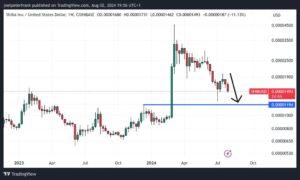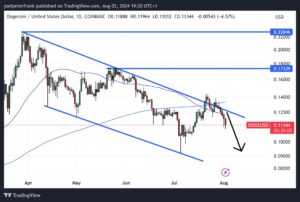
Morgan Stanley will allow its financial advisors to offer spot Bitcoin exchange-traded funds (ETFs) to eligible clients, marking a first for major Wall Street banks.
According to a report by CNBC, starting August 7, Morgan Stanley’s 15,000 financial advisors can solicit clients to purchase shares of BlackRock’s iShares Bitcoin Trust and Fidelity’s Wise Origin Bitcoin Fund.
HNWI Clients with High-Risk Tolerance
Other major Wall Street banks have not followed Morgan Stanley’s lead in offering Bitcoin ETFs. Firms like Goldman Sachs, JPMorgan, Bank of America, and Wells Fargo still prohibit their advisors from pitching these products.
The report stated that these banks only allow Bitcoin ETF trades if clients specifically request them, according to spokespeople from the institutions. This cautious approach contrasts with the adoption of digital assets among top financial firms.
ETF News: Morgan Stanley @MorganStanley tells wealth advisors they can pitch #Bitcoin ETFs as of August 7th. The crypto haters have come around. https://t.co/qdDwDzyV6S
Morgan Stanley on Friday told its army of financial advisors that it will soon allow them to offer bitcoin…
— MartyParty (@martypartymusic) August 2, 2024
Morgan Stanley is proceeding cautiously with its new offerings. According to people who know the policy, only clients with a net worth of at least $1.5 million and a high-risk tolerance will be eligible to invest. These investments will be limited to taxable brokerage accounts.
Sources said the bank will monitor clients’ crypto holdings to ensure they do not have excessive exposure to the volatile asset class. This measure is intended to maintain a balanced investment portfolio for clients.
Morgan Stanley has not yet committed to offering the newly approved Ethereum ETFs. According to sources, the bank is watching the market development for these products before making any decisions.
Morgan Stanley Ready for Bitcoin ETF Recommendation
In April, the company reportedly considered letting brokers actively recommend Bitcoin ETFs.
AdvisorHub indicated that Morgan Stanley was developing new safeguards for solicited purchases, as mentioned by two senior executives who were familiar with the plans.
These safeguards will include setting risk tolerance criteria, imposing limits on allocation, and regulating trading frequency. However, the executives did not specify when these policy changes will be implemented.















